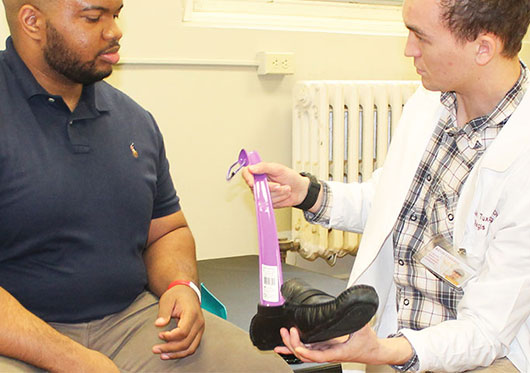It is not uncommon for people interested in patient care to compare occupational therapy and speech-language pathology, or speech therapy. In fact, these careers fall under the category of rehabilitation therapy which includes occupational therapy, speech therapy, and physical therapy. Professionals in all three of these fields work together to care for patients whose daily lives have been affected by a disability, injury, or illness.
Those who are interested in pursuing a career in rehabilitation therapy often find themselves torn between occupational therapy and speech therapy. Since the duties of these professions sometimes overlap and practitioners often collaborate with one another, it can be difficult to decide which career is right for you. Here’s a look at the differences between occupational therapy and speech therapy so you can better understand which role is best aligned to your goals.
What is an Occupational Therapist?
Occupational therapists (OTs) are practitioners who use therapeutic techniques to treat injuries, illnesses, or disabilities that affect patients’ ability to complete everyday activities which are important to them.
Occupational therapists treat a wide variety of patients in various settings. The majority of OTs work in state, local, or private hospitals and or in private practice offices. Other common work environments for these physical therapists include elementary and secondary schools at the state, local, and private levels, home healthcare services, or nursing care facilities.
What is a Speech-Language Pathologist?
Speech-language pathologists (SLPs), or speech therapists, are practitioners who diagnose, treat, and prevent communication and swallowing disorders. The primary goal of a speech therapist is to use therapeutic approaches to improve a patient’s ability to communicate and/or swallow.
Roughly 40 percent of SLPs work in educational environments at the state, local, and private levels, while other popular settings include private practices, hospitals, and nursing and residential care facilities.
While there are overlaps in the approach to patient care that both of these professions take, the two careers are distinct. Here’s a look at the distinguishing factors between occupational and speech therapy.
Occupational Therapy vs Speech Therapy: How Do They Differ?
While these careers are different from one another, the desire to help improve patients’ lives is a common thread between occupational therapy and speech therapy. For this reason, students who are looking to narrow their area of focus often compare the two professions.
Michael Roberts, associate professor and director of the master's in occupational therapy program at Regis College explains, “They are both interested in helping people be present and active in the world, and often collaborate on things like feeding and swallowing in rehab hospitals, social participation in school systems, and adapted communication for clients with aphasia.”
“The clearest difference,” Roberts continues, “is in the OT’s focus on the use of meaningful, goal-directed, personalized activity programs to restore independence and quality of life with a holistic focus on the client’s whole life, whereas the speech therapist is focused exclusively on the client’s swallowing or communication disorders and how to remediate them.”
In order to determine which career is right for you, it is important to understand how the roles and responsibilities, job growth, and required education for each profession differs. Once you thoroughly understand what each career entails, you can make an informed decision about which path will allow you to achieve your personal and professional goals.
Roles and Responsibilities
As Roberts points out, OTs and SLPs often collaborate with one another to address the needs of a patient. On a granular level, though, the roles and responsibilities of professionals in each field vary.
The common roles and responsibilities of occupational therapists include:
- Evaluating a patient’s condition and specific needs
- Designing treatment plans and setting goals to improve a patient's ability to live independently
- Assessing and documenting patient progress
- Evaluating and adapting patient environments to allow independence and ease daily activities
- Educating patients and caregivers on the use of special equipment and care techniques
- And more
It is also important to remember that there are several specialties that OTs can choose to pursue. The roles and responsibilities of an individual OT will vary depending on which focus they decide to specialize in. Board and specialty certifications offered by the American Occupational Therapy Association include:
- Gerontology
- Mental Health
- Pediatrics
- Physical Rehabilitation
- Driving and Community Mobility
- Environmental Modification
- Feeding, Eating, and Swallowing, Low Vision
- School Systems
While occupational therapists work to treat patients from head to toe, speech therapists are more narrowly focused on treating complications that affect speech, language, and swallowing abilities. Tasks commonly performed by speech-language pathologists include:
- Evaluating a patient’s speech, language, and swallowing ability
- Designing and carrying out individualized treatment plans to address a patient’s needs
- Assessing and documenting patient progress
- Educate patients and caregivers on techniques to manage communication and swallowing disorders
- And more
Who Makes More Money: OT or SLP?
Both occupational therapy and speech-language pathology are in-demand careers for those who wish to pursue a role in healthcare and rehabilitation services.
The occupational therapy field has grown rapidly in recent years and is expected to continue expanding. According to the Bureau of Labor Statistics, OT employment is projected to grow 11 percent from 2023 to 2033. Many factors can be attributed to this growth, including the need for experienced professionals to care for the aging baby boomer population and to treat patients with chronic conditions.
As a result of the demand for highly trained occupational therapy professionals, OTs can expect generous compensation for their skills. In 2023, it was reported that OTs earned a median annual wage of $96,370, or roughly $46.33 per hour.
Speech therapy, on the other hand, is also growing in popularity--the BLS projects an increase in employment at a rate of 18 percent from 2023 to 2033. Much like the occupational therapy field, more SLPs will be needed to treat speech and language disorders in the aging population. Additionally, as awareness of childhood speech and language disorders continues to rise, the demand for SLPs to treat this age group is increasing as well.
On average, speech-language pathologists earned slightly less than occupational therapists with a median salary of $89,290, or about $42.93 per hour, in 2023.
Required Education
Undergraduate education can vary for either career; however, occupational therapy and speech-language pathology both typically require a master’s degree or higher level of education in order to become a licensed practitioner.
Upon completion of an appropriately related bachelor’s degree, aspiring OTs often enroll in a master's in occupational therapy program. These programs usually take two to three years to complete and prepare students for the National Board for Certification in Occupational Therapy (NBCOT) exam. In order to become a licensed occupational therapist, students must pass the NBCOT exam, fulfill their fieldwork requirements, and follow the process to obtain state licensure.
Those who wish to become speech therapists, on the other hand, will need to pursue a master's in speech-language pathology. Once a student has completed a master's in speech-language pathology and passed the Praxis Examination in Speech-Language Pathology administered by the American Speech-Language-Hearing Association (ASHA), they can complete the process of applying for state licensure.
Choosing Your Path
Choosing between occupational therapy and speech therapy can be a difficult decision, so it is important to know how each career path aligns with your personal and professional goals. For those facing this decision, Roberts says, “If you are comparing Speech Therapy and OT, I would recommend looking at the scale, scope, and variety of ways you can practice each profession.”
“Speech therapists can work in inpatient, outpatient, and private practice settings to help restore their clients’ ability to communicate and connect with the world around them,” he continues. “OTs work in physical dysfunction settings, psychosocial dysfunction settings, long-term care, school systems, community-based organizations, as ergonomic or low-vision consultants, in assistive technology, in driving rehabilitation, and many more settings across the lifespan.”
One of the benefits of pursuing an occupational therapy career, says Roberts, is that “with an entry-level degree in OT there are almost no limits to the settings, practices, and populations you can explore.”
If you want to make a difference in the lives of patients while having the flexibility to work in a variety of settings, occupational therapy could be the right path for you.
Are you considering earning your master’s degree in occupational therapy and becoming an occupational therapist? Learn more about the different reasons it might be the right move for you.






